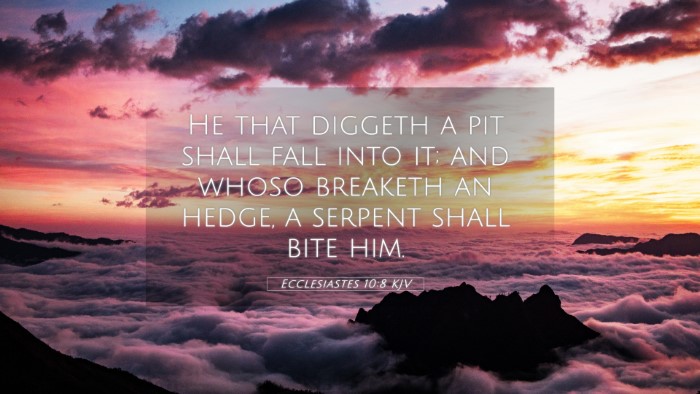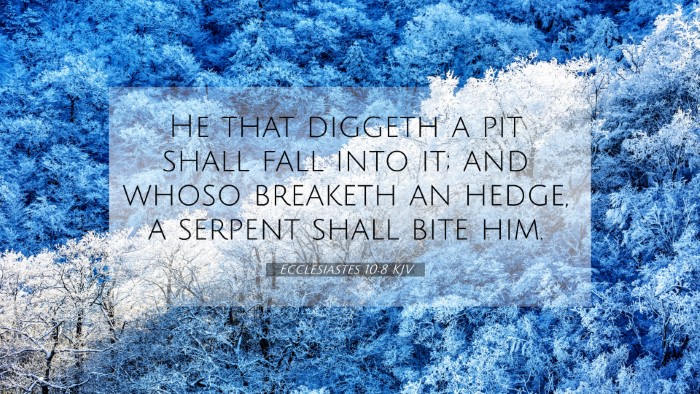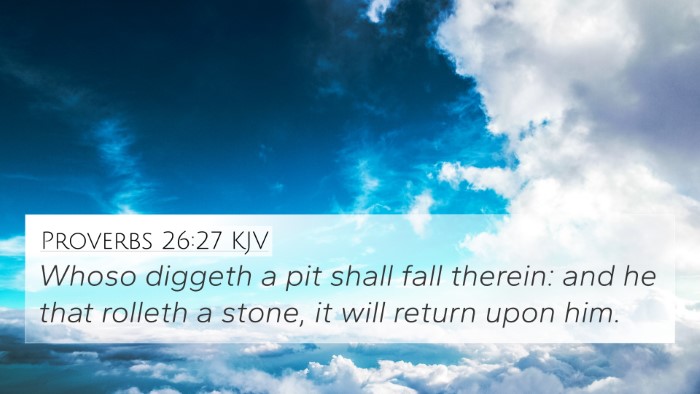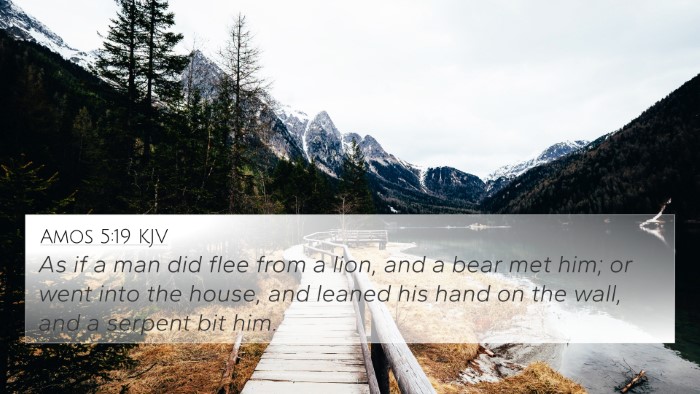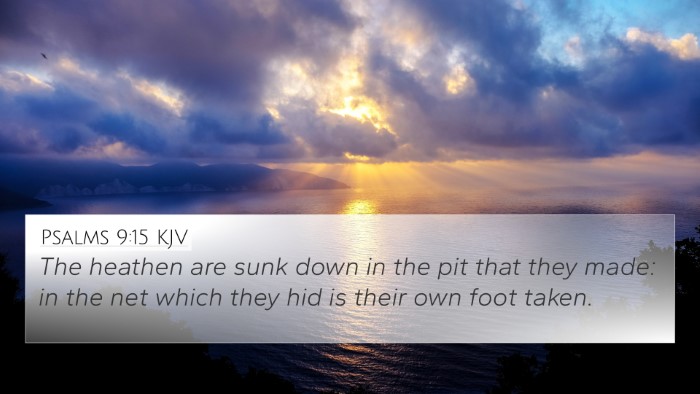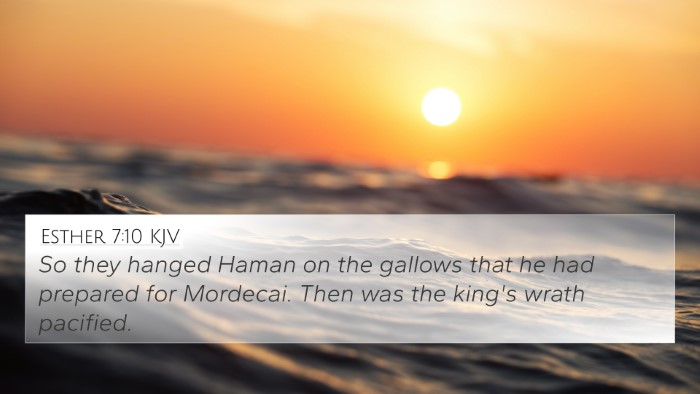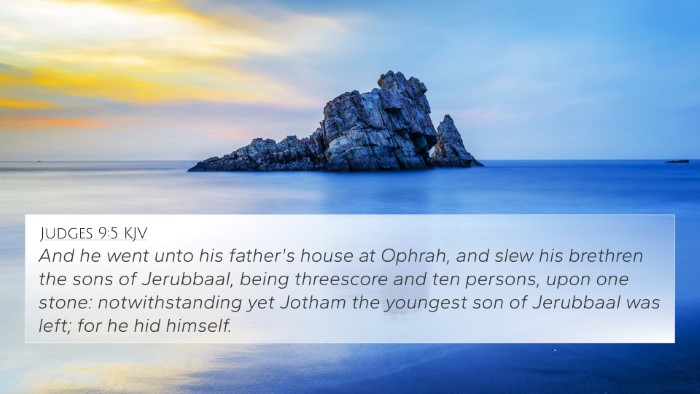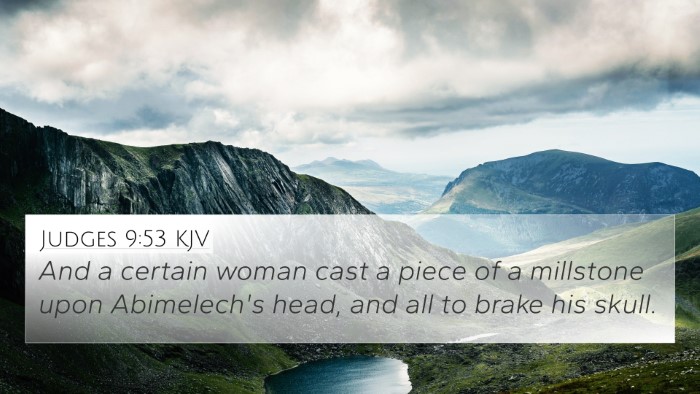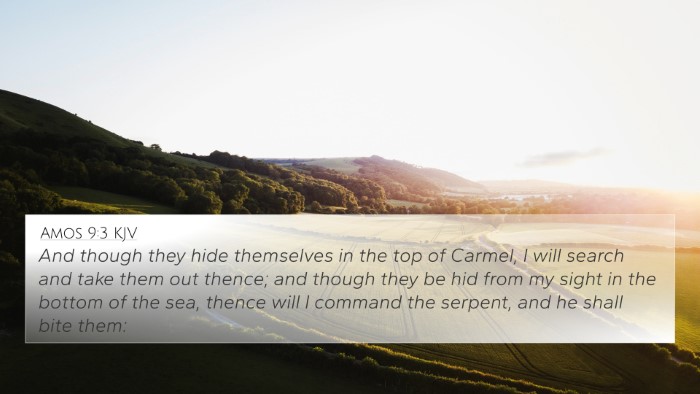Understanding Ecclesiastes 10:8
Verse: Ecclesiastes 10:8 - "He who digs a pit will fall into it, and whoever breaks through a wall will be bitten by a snake."
Summary of Meaning
The verse presents a profound principle concerning the consequences of one's actions, particularly regarding the endeavors that may seem innocuous but can lead to dire repercussions. It emphasizes that those who seek to harm or set traps for others may ultimately find themselves ensnared by their own schemes.
Insights from Commentaries
-
Matthew Henry:
Henry elucidates that there is a divine justice at play, suggesting that the wicked and deceitful intents will backfire. The imagery of digging and breaking serves as a metaphor for the self-destructive nature of wicked plans. Those who plot malevolently against others often find that they fall into the traps they themselves have set.
-
Albert Barnes:
Barnes notes that the verse serves as a warning. He explains that the fate of the wicked is to reap the harvest of their sowing. Digging a pit and breaking through a wall can symbolize actions driven by malice or folly, leading to inevitable repercussions.
-
Adam Clarke:
Clarke interprets this verse as a reminder of the futility of evil schemes. He highlights that the warning is clear: there is a moral order to the universe ordained by God where justice prevails, and the wicked will not escape the results of their wrongdoings.
Thematic Connections
This verse provides several thematic connections within the Bible:
- Proverbs 26:27: "Whoever digs a pit will fall into it; if someone rolls a stone, it will roll back on them."
- Job 4:8: "As I have observed, those who plow evil and those who sow trouble reap it."
- Galatians 6:7: "Do not be deceived: God cannot be mocked. A man reaps what he sows."
- Psalm 7:15: "He who digs a hole and scoops it out falls into the pit he has made."
- Isaiah 57:20-21: "But the wicked are like the troubled sea, when it cannot rest, whose waters cast up mire and dirt."
- Romans 2:6: "God 'will repay each person according to what they have done.'
- Matthew 7:2: "For in the same way you judge others, you will be judged, and with the measure you use, it will be measured to you."
- Proverbs 11:5: "The righteousness of the blameless makes their paths straight, but the wicked are brought down by their own wickedness."
- Luke 6:38: "Give, and it will be given to you. A good measure, pressed down, shaken together and running over, will be poured into your lap."
- Ecclesiastes 8:14: "There is something else meaningless that occurs on earth: the righteous who get what the wicked deserve, and the wicked who get what the righteous deserve."
Cross-Referencing Biblical Texts
The concept of cross-referencing in Biblical texts allows the reader to explore the deeper meanings and connections between scriptures. Here are some ways to approach cross-referencing related to Ecclesiastes 10:8:
- Tools for Bible Cross-Referencing: Utilize a Bible concordance or a cross-reference Bible study guide to find related scriptures.
- How to Use Bible Cross-References: Identify themes such as justice, moral consequences, and divine retribution.
- Bible Reference Resources: Use comprehensive Bible cross-reference materials for an in-depth study of these connections.
- Cross-Referenced Themes: Explore themes of wickedness, justice, and moral order throughout the scriptures.
- Identifying Connections: Study the links between Old Testament wisdom literature and New Testament teachings for a complete understanding.
Conclusion
Ecclesiastes 10:8 encapsulates an essential moral truth evident throughout the scriptures: the choices we make and the intentions behind them hold significant weight in the eyes of divine justice. The warnings presented through this verse resonate through cross-references in Proverbs, Psalms, and the New Testament, affirming the theme of reaping what one sows. Engaging in a comprehensive study using Bible cross-referencing tools will deepen understanding and provide richer insights into the interconnectedness of scriptural teachings.

